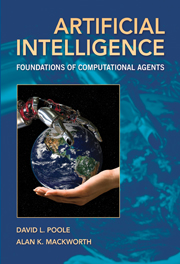Book contents
- Frontmatter
- Contents
- Preface
- I Agents in the World: What Are Agents and How Can They Be Built?
- II Representing and Reasoning
- 3 States and Searching
- 4 Features and Constraints
- 5 Propositions and Inference
- 6 Reasoning Under Uncertainty
- III Learning and Planning
- IV Reasoning About Individuals and Relations
- V The Big Picture
- A Mathematical Preliminaries and Notation
- Bibliography
- Index
6 - Reasoning Under Uncertainty
from II - Representing and Reasoning
- Frontmatter
- Contents
- Preface
- I Agents in the World: What Are Agents and How Can They Be Built?
- II Representing and Reasoning
- 3 States and Searching
- 4 Features and Constraints
- 5 Propositions and Inference
- 6 Reasoning Under Uncertainty
- III Learning and Planning
- IV Reasoning About Individuals and Relations
- V The Big Picture
- A Mathematical Preliminaries and Notation
- Bibliography
- Index
Summary
It is remarkable that a science which began with the consideration of games of chance should become the most important object of human knowledge … The most important questions of life are, for the most part, really only problems of probability …
The theory of probabilities is at bottom nothing but common sense reduced to calculus.
–Pierre Simon de Laplace [1812]All of the time, agents are forced to make decisions based on incomplete information. Even when an agent senses the world to find out more information, it rarely finds out the exact state of the world. A robot does not know exactly where an object is. A doctor does not know exactly what is wrong with a patient. A teacher does not know exactly what a student understands. When intelligent agents must make decisions, they have to use whatever information they have. This chapter considers reasoning under uncertainty: determining what is true in the world based on observations of the world. This is used in Chapter 9 as a basis for acting under uncertainty, where the agent must make decisions about what action to take even though it cannot precisely predict the outcomes of its actions. This chapter starts with probability, shows how to represent the world by making appropriate independence assumptions, and shows how to reason with such representations.
- Type
- Chapter
- Information
- Artificial IntelligenceFoundations of Computational Agents, pp. 219 - 280Publisher: Cambridge University PressPrint publication year: 2010

